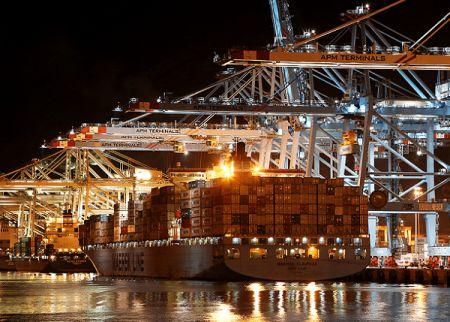(Agence Ecofin) – As major powers compete for influence over strategic maritime corridors and trade policies tighten, especially in the US, various questions are being raised about the impact on Africa, whose role in global trade is crucial.

Since Donald Trump’s re-election in the US, the specter of a trade war between the world’s major powers is looming. The US president’s clear interest in the Panama Canal and new customs tariffs announced on products from several allied as well as rival countries are creating new risks of tension on the global supply chain, which has already been tested in recent years by a series of international and multisectoral shocks (Covid-19, Russia-Ukraine conflict, fuel crisis, Israel-Hamas conflict).
While Trump’s administration’s intentions regarding the Panama Canal were seen as bluster by some observers only a few weeks ago, BlackRock made a surprise move in favor of the US by announcing on Tuesday, March 4, the acquisition of 90% of the shares in two strategic ports along this waterway (Balboa and Cristobal). According to several experts, this move strengthens US influence in the region and further tips the balance of the global maritime industry.

A major concern is the impact of this situation on Africa, a key player in global trade and geopolitics.
The Panama Canal, a Strategic Maritime Passage, but…
Built between the Atlantic and Pacific Oceans, this 80-meter engineering feat was constructed and operated by the US from 1914 to 1999 and has been the key point for trade between Asia and the Americas for over a century. Its role in maritime trade has become evident, as it saves ships from long detours around Cape Horn at the southern tip of South America. For example, expeditions from New York to San Francisco only cover 9,500 kilometers, less than half of the 22,500 km journey around Cape Horn.

Despite droughts affecting water flow and causing traffic to drop from 14,080 ships in 2023 to 9,944 in 2024, the waterway still handles nearly 5% of global traffic according to canal authority statistics. However, beyond its advantages, this route has become very costly, with increasingly high passage fees, according to the US president.
… but Less So for Africa
Primarily used for shipments from/to the US (about 74% of global traffic), China (21%), Japan, and South Korea, this maritime corridor also serves some ports in Central America and routes to Europe. It is not, however, a preferred route for trade with Africa. African flows to and from these countries typically follow routes that pass through the Atlantic or Indian Oceans, with transit through the Suez Canal or around the Cape of Good Hope.

However, direct flows between Africa and the West Coast of the US (Las Vegas, San Francisco) or some Central American countries, as well as indirect connections involving transit via other ports, may sometimes require a passage through Panama. The interaction with Africa thus appears limited, except for direct shipments to the West Coast of the US.
Opportunities for the Continent
Disruptions to the American maritime corridor could, however, benefit the Suez Canal (in Egypt). Its strategic geographical location allows it to connect certain maritime routes connected to the American canal. Unlike Panama, this canal, which handles over 10% of global traffic, allows ships to travel from Europe to Asia without having to go around Africa via the Cape of Good Hope, and without land transfer between the Mediterranean and the Red Sea.
But the Egyptian canal is also facing persistent constraints, especially since November 2023. The armed conflict between Israel and Hamas saw the involvement of Yemeni Houthi rebels, who attacked ships in the Red Sea linked to countries deemed allies of Tel Aviv. This situation led to a drop in traffic and persisted until a ceasefire in January 2025, which was recently broken.
With the US now conducting raids against Houthi positions, the hoped-for de-escalation of the crisis seems uncertain, as does the recovery of traffic, which fell by nearly 50%, resulting in a more than 60% drop in revenues for the Suez Canal in 2024.
US Tariff Protectionism Puts Pressure on Global Supply Chain
As during Donald Trump’s first term, the trade war between major powers could escalate, according to several observers. The US president, true to his « Make America Great Again » slogan, is imposing new tariffs on imports from China, Europe, Canada, and Mexico.

While no official date has been set for Europe, the measure is already in place for Chinese goods, while the date for Mexican and Canadian goods, initially set for March 4, 2025, has been postponed by one month.
In addition to tariffs, new taxes are also being announced on Chinese ships in US ports. These measures seem unlikely to ease pressure on the global supply chain.
Domino Effects…
In general, disruptions to major global maritime routes often have notable effects on the functioning of the global supply chain, causing significant delivery delays and additional costs for transporters and shippers.
These costs are passed on to the selling prices of goods, exacerbating inflation in fragile economies. The aforementioned shocks were no exception, and although not directly involving Africa, the Russia-Ukraine conflict was the primary cause of nearly universal inflation on the continent.
Among the actors who have commented on the new US port taxes on Chinese ships is CMA-CGM, the third-largest container shipping company in the world behind MSC and Maersk. « The US proposals to impose high port tariffs on Chinese ships would have a major impact on all companies in the container shipping sector, as most ships are built in China, » Reuters reports, citing a note from the French company.
According to international press reports, several companies are considering the possibility of relocation. This could benefit Africa, which offers, in addition to raw materials, more affordable labor and more competitive production costs. In the textile and apparel sector, countries such as Ethiopia, Egypt, Morocco, and Benin could attract companies impacted by US tariffs.

Morocco, South Africa, and Egypt, current leaders in Africa’s automotive industry, could become more attractive hubs for manufacturers. Similarly, in the technology and electronics assembly sectors, Kenya and Rwanda have made notable strides in setting up infrastructure for companies affected by these taxes.
Source: agenceecofin




